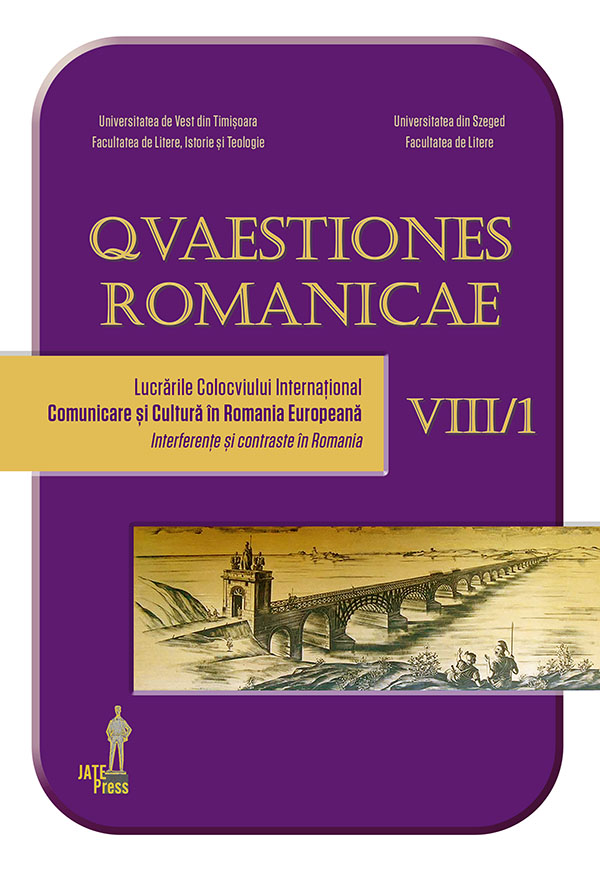Atitudinea Marilor Puteri europene faţă de crizele internaţionale majore din anii 1938-1939, reflectată în paginile cotidianului bănăţean Vestul. Studiu de caz: Anschluss-ul
Abstract: (The Attitude of the European Powers against the International Crisis of 1988-1939, Reflected in the Banat Newspaper “The West”. Case Study: The Anschluss) A press body of the National Peasant Party, the West newspaper, founded by Sever Bocu, the leader of the Banat organization, in the town of Bega, in 1930, will surprise in his pages, with great accuracy, the place of the Great Powers against the international crises in the years 1938-1939: the Anschluss, the annexation of Austria to National Socialist Germany, prepared in February 1938, following talks between von Papen (German Chancellor Deputy) and Schuschnigg (Austrian Chancellor), and the audience of the Hitler, and materialized on March 12, 1938; the Sudeten crisis, resolved through the ,,mediation” of Germany and Italy, assisted by France and the United Kingdom, which, through the conciliatory promotion, ,,gave” this province from the south of the Czechoslovak state, founded in 1918, with a majority population German, Third Reich, through the Munich Agreement (September 29, 1938); the Polish ultimatum addressed to the Czechoslovak government to surrender part of the Cieszyn mining region (September 30, 1938) settled in favor of Warsaw on 3 October 1938; the Hungarian-Czechoslovak negotiations started in Komarno (October 12, 1938), resolved by the Vienna agreement concluded at the end of October 1938), with only Germany and Italy being arbitrators, by the surrender of Slovakia and Ruthenia; the actual liquidation of the Czechoslovak state through the triumphal entrance of the Wehrmacht in Prague (March 15, 1939); the annexation of Albania by Italy, under the guise of a personal union, under the scepter of King Victor Emmanuel III (April 14, 1939); the attack on Poland by Germany (September 1, 1939), which marks the beginning of the Second World War.
Keywords: Great Powers, international crises, Banat, West newspaper, Sever Bocu.
Rezumat: Organ de presă al Partidului Naţional Ţărănesc, cotidianul Vestul, fondat de către Sever Bocu, liderul organizaţiei bănăţene, în oraşul de pe malurile Begăi, în anul 1930, va surprinde, în paginile sale, cu multă acurateţe, poziţia Marilor Puteri europene faţă de crizele internaţionale majore din anii 1938-1939: Anschluss-ul, adică alipirea Austriei la Germania naţional-socialistă, pregătită încă din februarie 1938, în urma discuţiilor dintre von Papen (vice-cancelarul german) şi Schuschnigg (cancelarul austriac), şi a audienţei celui din urmă la Hitler, şi materializată la 12 martie 1938; criza sudetă, rezolvată prin ,,medierea” Germaniei şi Italiei, ,,asistate” de Franţa şi Marea Britanie, care, prin conciliatorismul promovat, au ,,dăruit” această provincie din sudul statului cehoslovac, întemeiat în anul 1918, cu o populaţie majoritar germană, celui de-Al Treilea Reich, prin acordul de la München (29 septembrie 1938); ultimatumul polonez adresat guvernului cehoslovac de a ceda o parte din regiunea minieră Cieszyn (30 septembrie 1938), soluţionat în favoarea Varşoviei, la 3 octombrie 1938; negocierile ungaro-cehoslovace demarate la Komarno (12 octombrie 1938), rezolvate prin acordul de la Viena, încheiat la sfârşitul lunii octombrie 1938), arbitri fiind doar Germania şi Italia, prin cedarea Slovaciei şi Ruteniei; lichidarea efectivă a statului cehoslovac, prin intrarea triumfală a Wehrmacht-ului în Praga (15 martie 1939); anexarea Albaniei de către Italia, sub masca unei uniuni personale, sub sceptrul regelui Victor Emmanuel al III-lea (14 aprilie 1939); atacarea Poloniei de către Germania (1 septembrie 1939), dată care marchează începutul celui de-Al Doilea Război Mondial.
Cuvinte-cheie: Marile Puteri, crizele internaţionale, Banat, cotidianul Vestul, Sever Bocu.
